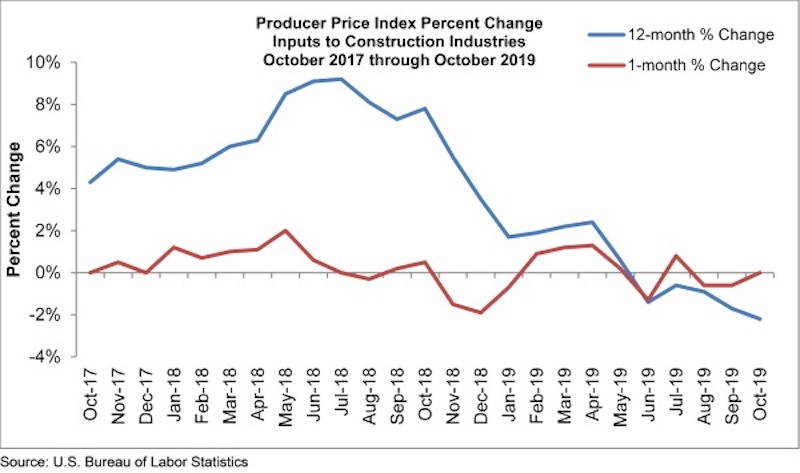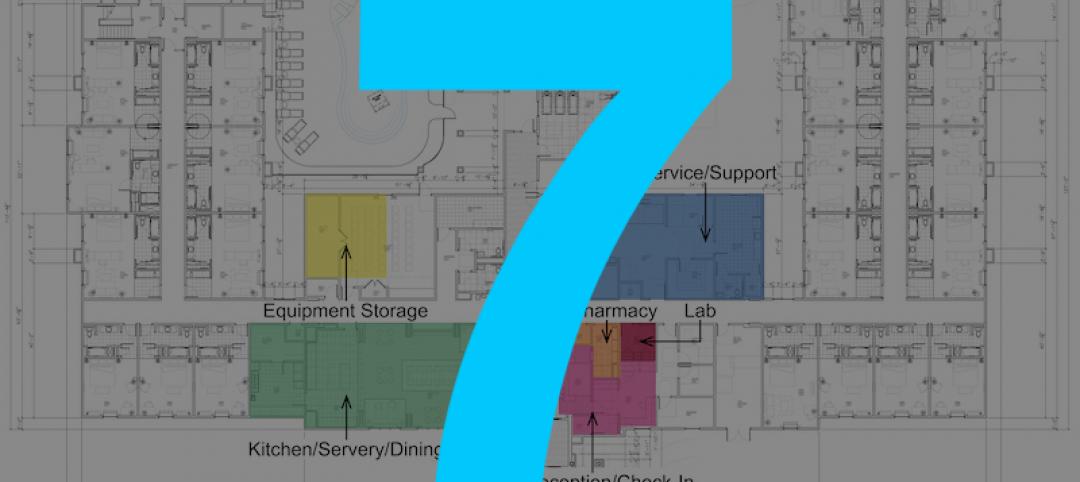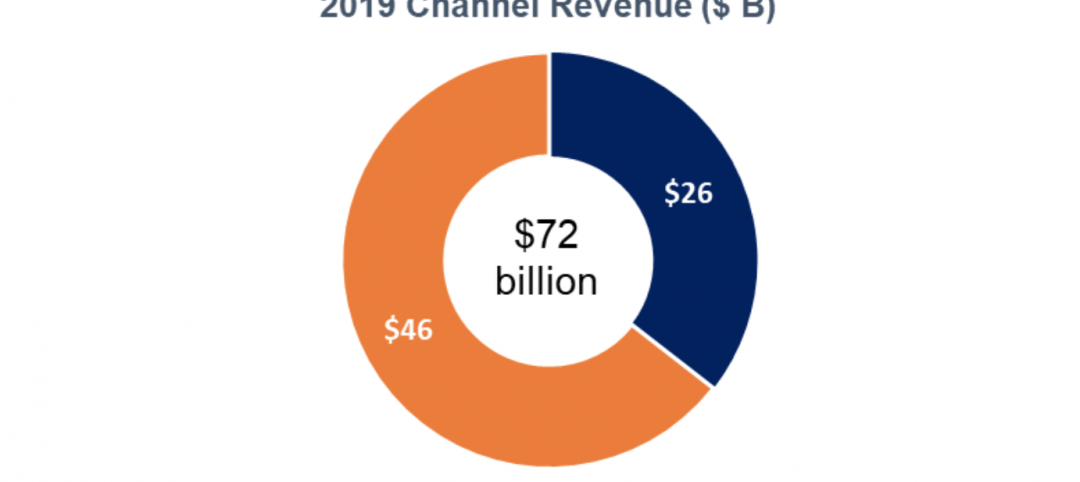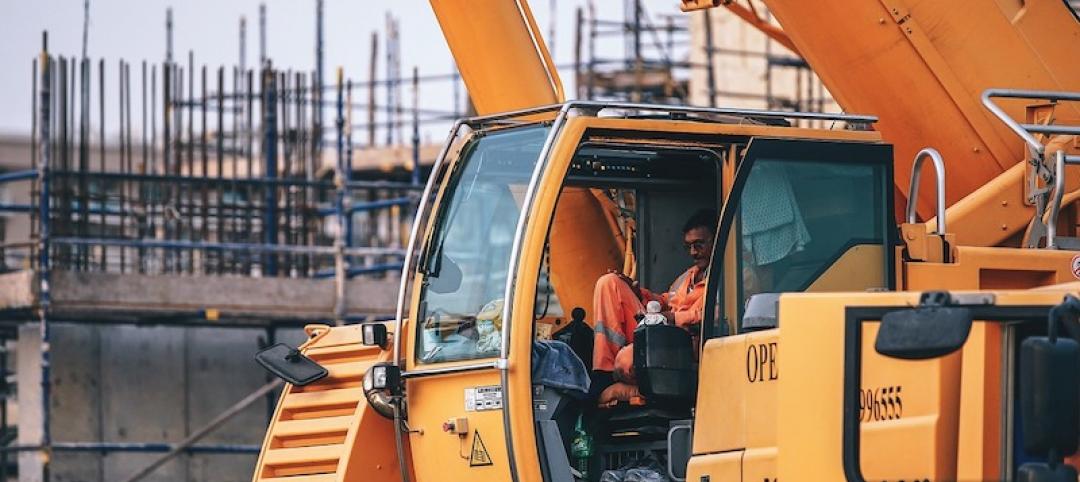Construction input prices remained unchanged on a monthly basis in October but are down 2.2% year-over-year, according to an Associated Builders and Contractors analysis of U.S. Bureau of Labor Statistics’ Producer Price Index data released today. Nonresidential construction input prices fell 0.1% for the month and are down 2.0% compared to the same time last year.
Falling energy prices accounted for much of the year-over-year price decline. Among the eight subcategories that decreased, the most significant were in natural gas (-31.8%), crude petroleum (-29.8%) and unprocessed energy materials (-26.3%). Monthly natural gas prices, however, were up 7.7% from September, likely due in part to seasonal factors. Two other subcategories had year-over-year decreases greater than 10%: iron and steel (-16.1%) and steel mill products (-13.1%).
“New month, same story on materials prices,” said ABC Chief Economist Anirban Basu. “While the decline in crude petroleum prices in October may have been caused by a spike in oil prices in September due to an assault on Saudi facilities, price weakness was apparent in several other materials categories as well. Many categories experienced effectively no change in price whatsoever on a monthly basis, including key materials such as softwood lumber, concrete, plumbing fixtures and the segment that includes prepared asphalt.
“While the U.S. nonresidential construction sector remains busy and a majority of contractors expect to see an increase in sales over the next few months, according to ABC’s Construction Confidence Indicator, materials prices continue to languish due to a combination of a weakening global economy, a sturdy U.S. dollar and recently observed declines in investment in structures. The lifting of tariffs on certain producers of steel and aluminum earlier this year may also be playing a factor, with iron and steel prices down approximately 16% compared to one year ago and the price of steel mill products down more than 13%.
“Contractors can expect more seesawing in materials prices going forward as opposed to smooth declines,” said Basu. “There is evidence that certain parts of the global economy are firming, which will help stabilize the demand for certain materials. The U.S. dollar is no longer strengthening as it had been, in part because the Federal Reserve has pursued an easier money policy this year. That said, there could be a dip in oil prices next year as more supply comes online from nations such as Canada, Norway, Brazil and Guyana.”
Related Stories
Market Data | Apr 10, 2020
5 must reads for the AEC industry today: April 10, 2020
Designing for the next generation of student life and a mass timber Ramada Hotel rises in British Columbia.
Market Data | Apr 9, 2020
7 must reads for the AEC industry today: April 9, 2020
Urine could be the key to building in outer space and how to turn a high school into a patient care center in just over two weeks.
Market Data | Apr 8, 2020
6 must reads for the AEC industry today: April 8, 2020
Stantec discusses how hospitals can adapt buildings to address worst-case scenarios and FXCollaborative Architects tells us why cities will survive the pandemic.
Market Data | Apr 7, 2020
7 must reads for the AEC industry today: April 7, 2020
Leo A Daly's Hotel2Hospital prototype takes shape, while the number of delayed projects reaches 2,550 in the U.S. amid coronavirus pandemic.
Market Data | Apr 3, 2020
COVID-19 cuts nonresidential construction employment in March
The construction unemployment rate was 6.9% in March, up 1.7 percentage points from the same time one year ago.
Market Data | Apr 1, 2020
February’s construction spending decline indicates what’s to come
Private nonresidential spending declined 2% on a monthly basis and is down 0.7% compared to February 2019.
Market Data | Mar 26, 2020
Architects taking action to support COVID-19 response
New AIA task force will offer insights for adapting buildings into healthcare facilities.
Market Data | Mar 26, 2020
Senate coronavirus relief bill's tax and lending provisions will help construction firms, but industry needs additional measures
Construction officials say measure will help firms cope with immediate cash flow crunch, but industry needs compensation for losses.
Market Data | Mar 25, 2020
Engineering and construction materials prices fall for first time in 40 months on coronavirus impacts, IHS Markit says
Survey respondents reported falling prices for five out of the 12 components within the materials and equipment sub-index.



















